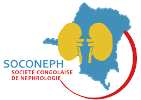Mannix Imani Masimango , Michel Jadoul, Elizabeth A. Binns-Roemer, Victor A. David, Ernest Kiswaya Sumaili, Cheryl A. Winkler, Sophie Limou
Introduction
APOL1, GSTM1 risk variants, and sickle cell trait (SCT) are associated with chronic kidney disease (CKD) among African Americans (AAs). Nevertheless, such evidence remains scarce in sub-Saharan Africa (SSA) populations.
Methods
In a cross-sectional study, we evaluated the prevalence of these risk variants and their association with estimated glomerular filtration rate (eGFR), albuminuria, and CKD in urban (n = 587) and rural (n = 730) adults from South-Kivu, DR Congo (DRC). Furthermore, we evaluated APOL1 recessive model (high risk [HR] vs. low risk [LR]), SCT carriage, and the active versus inactive GSTM1 genotypes.
Results
The frequencies of the APOL1 G1 and G2 alleles were 8.7% and 9.1%, respectively, and 3.2% carried the HR genotype. SCT and GSTM1 null allele frequencies were 3.8% and 51.2%, respectively. APOL1 HR was associated with lower eGFR (P = 0.047, odds ratio [OR] = 4). Individuals with SCT exhibited lower eGFR (P = 0.018), higher albuminuria (P = 0.032), and 2.4× increased risk of CKD (P = 0.031). APOL1 HR and SCT were synergistically associated with lower eGFR (Pinteraction = 0.012). The GSTM1 null allele was not significantly associated with any renal outcomes.
Conclusion
Our study highlighted the impact of APOL1 and SCT variants on poorer renal outcomes in the DRC and advocates for further genetic studies in SSA settings.
